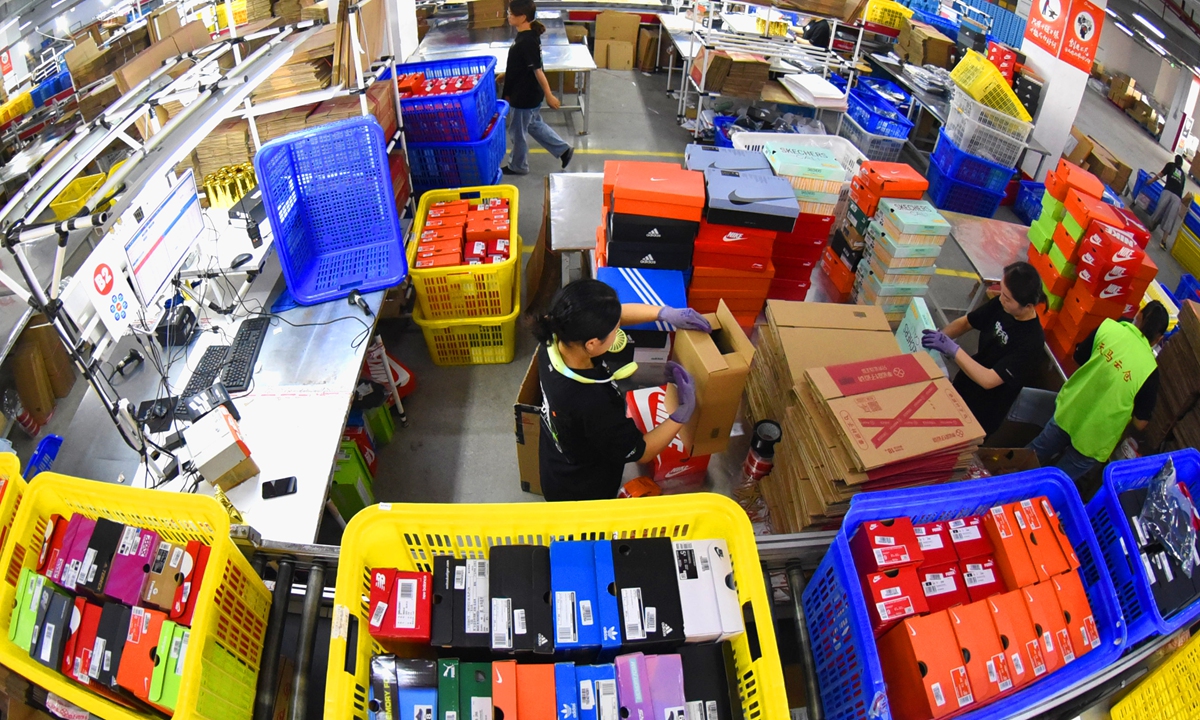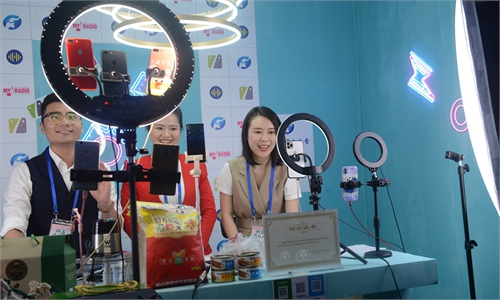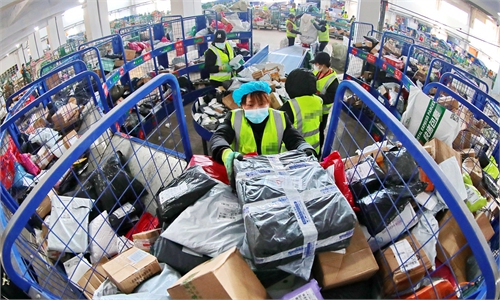
Staff at an industry zone in Lianyungang, East China's Jiangsu Province sort packages on Friday, the day China's major e-commerce platforms including JD and Alibaba's Tmall celebrate this year 618 mid-year shopping festival. Photo: VCG
Major Chinese e-commerce platforms have reported record sales during this year's just-ended June 18 (618) shopping festival, shrugging off concerns that consumer demand is "faltering" amid the continuous impact of the epidemic and a decline in retail trade for three months.Although the growth shows some slowdown according to data from China's e-commerce giant JD.com, and lingering epidemic control measures have caused some problems with deliveries, the promotion, which ran for the past 18 days and concluded Sunday, has become further proof of consumption recovery and growing consumers' appetite in the world's second largest economy.
Chinese observers are also optimistic toward the strong recovery in Chinese consumption triggered by this promotion, and predicted that the Chinese economy will see an upward trend from June with the recent Omicron flare-ups largely brought under control, while GDP growth in the third quarter could be around 6.8 percent.
Total sales by JD.com hit a record 379.3 billion yuan ($56.47 billion) in the past 18 days, according to the company.
In 10 minutes of the last round of promotion starting from 8 pm on Friday, sales of smart phones rose 200 percent on JD.com, with domestic brand HONOR selling 100,000 handsets in one minute, according to data released by JD.com.
The "618" shopping festival was proposed by China's e-commerce giant JD.com to celebrate the company's founding anniversary, but has now become a nationwide shopping spree with nearly all shops and merchants on and off line taking the opportunity to boost sales.
Other major e-commerce platforms also reported improved sales performances. Suning.com, which has both online and offline stores, told the Global Times Sunday that offline stores led the spending recovery during this year's shopping festival, with sales surging 182 percent year-on-year. Orders worth more than 70,000 yuan saw a 103-percent year-on-year increase, the company said.
Sales data released by Pinduoduo over the weekend showed that the sales of home appliances on the platform had doubled from a year earlier.
The 618 sales festival indicated the national economy has bottomed out with a strong growth momentum, Tian Yun, former vice director of the Beijing Economic Operation Association, told the Global Times on Sunday.
If the consumption and export indexes for June, July and August maintain a clear momentum of recovery, Tian believed that China's economy will see an upward trend from the second quarter this year, and predicted that the year-on-year GDP growth rate for the third quarter would stand at 6.8 percent.
Rising sales
"I was waiting for the festival to stock up on milk powder for my newborn baby," a resident in Shanghai told the Global Times. She bought clothes and other daily necessities for her son from both online and offline stores.
In general, the proportion of basic consumption has increased. Taking JD.com as an example, sales of ice cream increased by 800 percent within 10 minutes of the opening of 618. In addition, sales of goods such as jerky, milk, and peanut oil also increased significantly, Meng Qi, an industry observer told the Global Times on Sunday.
In addition to domestic brands, many overseas brands are also enjoying record sales during this year's 618 event.
More than 29,000 overseas brands from 87 countries and regions joined the shopping spree on Alibaba's Tmall, including more than 3,000 new overseas brands, according to a statement sent by Tmall to the Global Times.
Prada's sales in the first hour on Tmall since this year's festival kicked off on May 31 grew by triple digits from last year.
In addition to traditional e-commerce platforms, new innovative players such as livestreaming platform giant Douyin have also entered the new business arena.
Data from Douyin showed that from June 1 to 18, the number of merchants participating in the sales festival increased 159 percent year-on-year, with total livestreaming of more than 40 million hours, contributing to production resumption.
Shopping fever in many places gradually picked up during the 618 festival. According to Douyin, Shanghai consumers showed strong purchasing power, ranking first in purchasing volume, followed by Chongqing, Beijing, Chengdu and Guangzhou.
Juhuasuan, a group-buying website under Alibaba Group, said that on June 1, sales of smart locks increased by 454 percent year-on-year, water filters increased by 243 percent year-on-year, and bluetooth headsets increased by 1,516 percent year-on-year, which reflect the consumption upgrade trend in third-, fourth-, and fifth-tier cities and even rural areas.
Amid growing sales, the epidemic prevention and control measure however have caused some uncertainties in delivery and logistics.
A staff member from a Shanghai-based body care product manufacturer told the Global Times on Sunday that some goods were stuck or returned in logistics in some places due to the epidemic control measures, which brought complaints from buyers and an increase in costs.
But he said the sales target has basically been reached, thanks to the help of livestreaming channels such as Douyin and Kuaishou, in addition to traditional platforms such as Taobao.
Chinese economic activities fell sharply in most of May as expected. During May, China's retail sales of consumer goods plunged by 6.7 percent on a yearly basis to end at 3.35 trillion yuan, followed by a decline in retail by more than 11 percent in April and fall of 3.5 percent in March.
To stimulate the economy, China's State Council, the country's cabinet, in May held what was seen as an unprecedented national video teleconference on stabilizing the economy with reportedly upwards of 100,000 participants, including officials of various levels, stressing the need to better implement measures to safeguard the economy operating in a reasonable range.
China's consumption market now has many positive factors, such as the supply chain being under continuous recovery, the operating rate in areas severely affected by the epidemic increasing significantly, and logistics speed accelerating. It is also expected that consumption of goods such as automobiles and home appliances will rebound strongly in the second half of this year, Zhao Ping, vice-president of the Academy of the China Council for the Promotion of International Trade, told the Global Times on Sunday.


